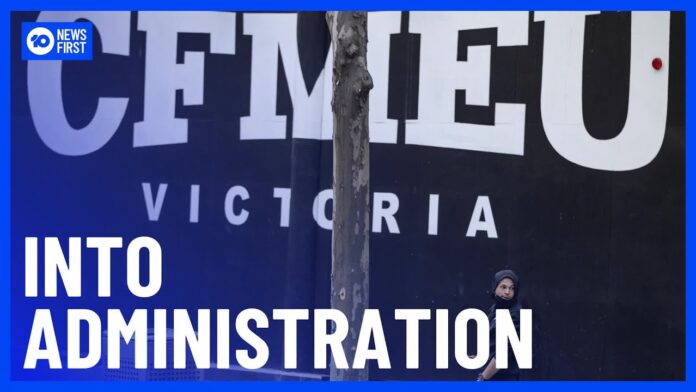The entire construction division of the CFMEU, including Western Australia and act branches, is now under administration for a minimum of three years, following allegations of corruption and intimidation
In a dramatic move, the federal government has placed the Construction, Forestry and Maritime Employees Union (CFMEU) construction arm into administration, effective immediately. This decision impacts all branches, including those in Western Australia and the Australian Capital Territory, despite earlier indications they might be excluded.
Attorney-General Mark Dreyfus announced the takeover on Friday, just days after new legislation was passed by parliament to facilitate the administration. The decision follows serious allegations of corruption, criminal infiltration, and threats from organized crime towards the CFMEU.
The Fair Work Commission has appointed Victorian barrister Mark Irving KC as the administrator. This intervention comes after an investigation revealed allegations of bikie threats related to major taxpayer-funded projects, raising concerns about the union’s conduct.
Prime Minister Anthony Albanese emphasized the government’s stance against corruption in the building industry. “While trade unions play a vital role in protecting workers’ rights, there is no place for corruption or intimidation,” he stated. Albanese’s comments reflect a broader government effort to address perceived malpractices within the CFMEU and the construction sector.
The CFMEU, a prominent trade union in Australia, has faced criticism for alleged bullying and misconduct over the years. The appointment of an administrator is seen as a necessary step to clean up the union’s operations, which have been accused of stifling productivity and increasing construction costs through corrupt practices.
Master Builders Australia welcomed the move, describing it as overdue. The organization criticized the union’s long-standing culture of corruption, which it claims has harmed the construction industry and taxpayers. However, it also supported the Coalition’s call for a new regulatory body with enhanced powers, following the abolition of the Australian Building and Construction Commission last year.
The new legislation, which was fast-tracked through parliament, includes provisions that prevent the CFMEU from making political donations during the administration period. This decision was a key aspect of the legislation, aiming to curb any undue political influence by the union.
Labor’s legislative efforts faced resistance from the opposition and the Greens, who sought additional amendments. Shadow Workplace Relations Minister Michaelia Cash criticized the government for not requiring the removal of CFMEU National Secretary Zach Smith, questioning how effective the administration would be if key figures from the previous leadership remained.
The Greens, while opposing the legislation, argued that it undermined the rule of law and accused the government of being too lenient on the union. They maintained that they accept no funding from the CFMEU and are committed to maintaining legal standards.
CFMEU National Secretary Zach Smith has denounced the administration as a “targeted attack on construction workers,” arguing that it undermines the union’s democratic rights. He has been contacted for further comments but has yet to respond.
Analysis:
Political:
The imposition of administration on the CFMEU construction arm marks a significant intervention in the Australian labour movement, reflecting the government’s commitment to tackling corruption within powerful unions. This move aligns with the Albanese government’s broader agenda of reforming the building industry and addressing misconduct. The quick passage of legislation and the administration’s comprehensive scope, including branches previously considered exempt, underscore a determined stance on eliminating corrupt practices. This political action aims to restore integrity and transparency in union activities, potentially influencing future labour and regulatory policies.
Social:
The decision to place the CFMEU into administration resonates with broader societal concerns about corruption and accountability in institutions that represent workers. The CFMEU’s alleged involvement in criminal activities and threats has stirred public debate about the role of unions in maintaining ethical standards. The move reflects a societal push towards greater oversight and transparency in organizations that hold significant influence over workers’ rights and industry practices. It also highlights the tension between union power and public trust, emphasizing the need for reforms to ensure unions act in the best interests of their members and the broader community.
Racial:
The administration of the CFMEU does not have a direct racial impact but indirectly affects all members, including those from diverse racial backgrounds. Unions like the CFMEU play a crucial role in advocating for fair labour practices, including issues related to racial equality in the workplace. By addressing corruption within such a significant union, the government aims to promote a more equitable environment for all workers, regardless of their racial or ethnic background. This move could contribute to a more transparent and fair labour market, benefiting workers across various racial and ethnic groups.
Gender:
The administration of the CFMEU could have implications for gender equity within the construction industry. Historically, the construction sector has been male-dominated, and allegations of corruption and intimidation may disproportionately affect women and other underrepresented groups in the industry. By addressing misconduct within the CFMEU, the government aims to create a more equitable environment that supports fair treatment for all workers, including women. The reform efforts may lead to better practices and policies that enhance gender equality in the workplace.
Economic:
The economic implications of placing the CFMEU into administration are significant. The union’s alleged corrupt practices have been criticized for increasing construction costs and stifling industry productivity. By intervening and restructuring the CFMEU, the government aims to mitigate these economic inefficiencies and restore confidence in the building sector. The appointment of an administrator and the ban on political donations are expected to create a more transparent and accountable environment, potentially leading to cost savings and improved industry performance. This move also aligns with broader economic goals of fostering a competitive and fair construction market, benefiting both businesses and consumers.
